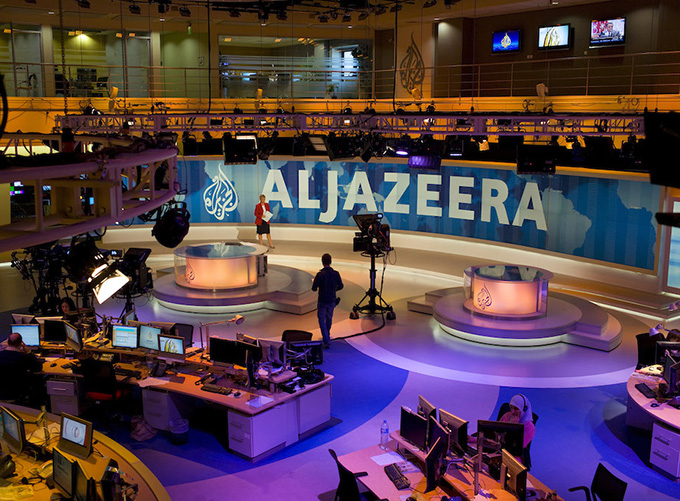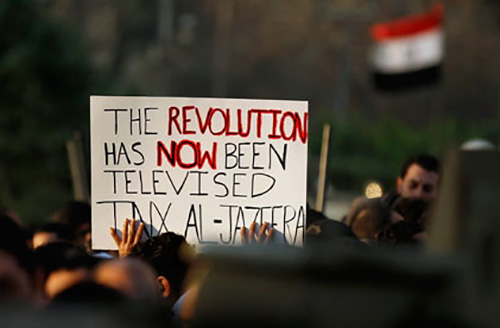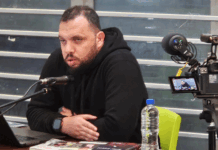
ANALYSIS: By Dr Tarek Cherkaoui
Diplomatic quarrels in the Arabian Peninsula have a long history, and small Gulf States, such as Qatar, align themselves with stronger powers in order to confront regional threats. This was the case under Ottoman rule and British colonial rule.
However, after the British withdrawal from east of Suez in 1971, Saudi Arabia became the de facto protector of Qatar. This situation lasted until the early 1990s, when Saddam Hussein’s Iraq invaded Kuwait in 1990 and threatened to invade Saudi Arabia as well.
It became quickly apparent that the Saudis were unable to defend their own borders, let alone their neighbours’ too.
During that period, Qatar was mostly known for being “unknown”. However, its path was about to witness a major change at the hands of the Crown Prince at the time, and future Emir, Sheikh Hamad bin Khalifa Al Thani, who had a very different view on the future role of Qatar.
He sought from the onset to resist Saudi suzerainty, and relations between both parties reached their lowest points in February 1996, when an attempted coup against Qatar’s leader was foiled. Needless to say, Saudi Arabia, the United Arab Emirates (UAE) and Bahrain supported this coup attempt.
Fast-forward 20 years later, and the same players are back to square one. Only this time, the scope of hostile actions, speed of escalation, and toxic rhetoric directed at Qatar by the quartet —the aforementioned countries in addition to Egypt — has surprised most analysts.
In the absence of a manifest casus belli, one was swiftly manufactured. On 24 May 2017, unidentified hackers exploited a cyber-bug in the website of Qatar News Agency (QNA) to disseminate fabricated news. The fake report claimed that Qatar’s Emir was critical of the United States while praising Hezbollah and Hamas as resistance movements. The Qatari authorities immediately asked the United States for help, and a Federal Bureau of Investigations team led a thorough investigation. A few weeks later, Qatar’s attorney-general stated that communication used in the security breach originated from countries laying siege to Qatar.
Damage was done
By then, the damage was already done. Diplomatic ties were cut; Qatar’s airspace and shipping channels were blockaded; food supplies were stopped; Qatari nationals became persona non grata in three neighbouring countries at heavy human and financial costs; not to mention the other substantial economic and trade ramifications for the entire region.
Refusing to accept official Qatari denials about the fabrications planted in the QNA website, the anti-Qatar quartet issued an ultimatum of 13 demands to be fulfilled within ten days (extended by two days) before they would consider ending this blockade. The list included paying reparations, shutting down the Al Jazeera satellite-broadcasting network (AJ), curbing bilateral relations with Iran, closing a Turkish military base, and submitting to monthly external compliance checks.
In short, these demands constituted a frontal assault on Qatar’s sovereignty.
AJ’s closure was undoubtedly high in the list of demands, especially when considering that its website was also blocked by the four countries’ internet providers, and hotels were warned against airing AJ’s channels in their premises, or else they would pay hefty fines. The pressing question that comes to mind following these developments is the following: why is AJ in the crosshairs of the quartet?
In my view, there are three main reasons for this state of affairs. Firstly, AJ’s establishment in 1996 was part of a larger Qatar modernisation campaign, through which the leadership aspired to reinvigorate the state in order to accomplish noteworthy endeavours internationally, thereby asserting the country’s autonomy and distinctiveness in contrast to its Gulf neighbours in several areas, such as education, culture, sports, and media.
Concerning the latter, AJ has been a perennial irritant for autocratic leaders and dictators in the Middle East. Before AJ’s launch, government-controlled television was the defining feature of local and regional broadcasting in the Middle East. This meant that official Arab television media was no more than a mouthpiece for government policies. Their coverage consisted mainly of barren and repetitive broadcasts, mostly intended to sing the praise of the rulers’ actions. Even live interviews were not tolerated, as interviewees’ opinions had to be checked before being aired.
On the other hand, the Qatari leadership minimised any government interference with the AJ network’s affairs. Therefore, despite being launched as a state-financed satellite channel, the Qatari government’s subtle distancing made AJ look similar to the BBC rather than a state-controlled Arab network. In contrast to other Arab television networks, where little to no sensitive political, social, economic, or religious subjects were ever discussed, AJ introduced several talk shows that were fast paced, innovative, and daring.
Exemplifies the change
One weekly programme that exemplifies the change brought forward by AJ was Al Ittijah Al Mo’akis (The Opposite Direction). Launched in November 1996 (and it still airs today), this programme is presented by Faisal al-Kasim, a Syrian Druze, who had worked for the BBC for many years. The presenter spends the first two minutes asking questions that reflect positions on a chosen topic, and then opens the floor to two guests representing opposite sides of the spectrum.

The show stirred up controversies and regularly features opponents of Arab regimes. It also received plenty of official complaints and censure from these governments. For example, Abdullah Al Nafisi, a Kuwaiti intellectual who was the guest of this talk show, launched a salvo of criticism against the Gulf monarchs and attacked the Saudi religious establishment for ignoring major issues such as royal corruption.
As a result, Saudi authorities added more restrictions against AJ, and coerced the only Saudi journalist working for AJ to resign from the network. Also, on 27 January 1999, the programme hosted a debate about the then-raging Algerian civil war. The oppositional viewpoint clearly gained the upper hand in the debate, at which point the Algerian authorities cut the electricity supply to the capital Algiers (and other cities) to prevent the programme from screening.
Even Qatari governmental positions constituted no red line for the daring Syrian anchor, whose programme discussed Qatar’s overtures to Israel and hosted a professor of political science at Qatar University, who heavily criticised his government’s policies.
Al-Kasim wrote: “Al Jazeera’s editorial policy is so lax that I am hardly ever given orders regarding programme content. The station has an even wider scope of freedom than the BBC Arabic radio, where I worked for 10 years. I tackle issues that I never even dreamed of covering during my service at the BBC.”
With such editorial independence, AJ exposed the misdeeds of local regimes and served as a platform for opposition groups by airing controversial debates, and exposing corruption and widespread human rights abuses. The winds of freedom blown by AJ meant also that repressive regimes no longer had the monopoly over information. By transcending borders, AJ’s broadcasts were able to bypass the restrictive state media, connect with communities, challenge the official discourse, and expose the regimes’ lack of legitimacy.
This situation obliged autocratic Arab rulers to become much more attentive to public opinion. They viewed with deep scepticism this media institution, in which anchors and guests routinely deliberate democracy, good governance, and human rights. For them, AJ not only plays a big role in the development of free flowing information and freedom of expression, but also acts as an agency of representation that allow diverse social groups and classes to express their views that could, if left unchecked, start influencing decision making processes within their realms.
Everyone has a say
Arguably, AJ seems to echo the deliberative-discursive model of a Habermasian public sphere (1), for democracy is not just a voting-centric arena, in which fixed preferences and interests compete via mechanisms of aggregation. Rather, democratisation starts when everyone has a say. Voices rather than votes are the vehicle of empowerment.

Secondly, when a series of uprisings and mass protests hit North Africa and the Middle East from January 2011 onwards — also known as Arab Spring — they confronted repressive regimes and military juntas. These demonstrations called for an end to nepotism and corruption, improvement of economic conditions, establishment of democratic representation, and protection of human rights.
AJ, through both its Arabic and English networks (AJA and AJE), was well positioned to cover these events. With AJA already enjoying strong pan-Arabic viewership, AJE targets different English-speaking markets, such as New Zealand where it is available on Sky and Freeview.
These networks both covered events in Tunisia, when a young vegetable cart owner called Mohamed Bouazizzi immolated himself after being humiliated by police, igniting several protests across the country. AJ was one of the first outlets to broadcast pictures of his self-immolation, even though its bureau had been closed for years by the Tunisian regime. Using mobile phone footage and social media, AJ outmanoeuvred both the regime and the competition by grasping very early the meaning and magnitude of the protests. They eventually brought about the demise of the Tunisian dictator; an outcome many in the region considered impossible.
The 24/7 coverage provided by AJ during the Arab Spring events, combined with viral social media, online blogging, and mobile telephony, vividly publicised the uprisings. This boosted the spirits of activists and encouraged more resistance and mass defiance. Jordanian Maisara Malass, an opposition activist, described AJ as a “media brigade” whose coverage had helped “to spread the revolution from one city to the other”.
AJ’s Arab Spring coverage was sharp and relentless, even if at times it was deemed more sympathetic to some forces (e.g. Muslim Brotherhood). Nevertheless, in Egypt, AJ’s reporting attracted world attention to the demonstrations and gave events a human dimension, thereby creating a bond between viewers in their living rooms and the protesters in Tahrir Square. When demonstrators ultimately forced former Egyptian President Hosni Mubarak to quit power, many people around the world embraced the narrative conveyed by AJ, whose journalistic efforts were rewarded with the Columbia Journalism Award (2011) bestowed by Columbia University’s Graduate School of Journalism.
On the other hand, the initial success encountered in some Arab Spring countries triggered heavy-handed reactions from the Gulf autocratic regimes, such as Saudi Arabia and the UAE, which felt threatened by the democratic advance in some countries (e.g. Tunisia).
Real-life Game of Thrones
Consequently, they interfered with and deteriorated the situation in these countries, inciting and materially supporting their proxies to use putsches, counter-revolutionary movements, false-flag terrorist groups, and extended repressive means. Such methods turned peaceful demonstrations into civil wars, as in Libya, Syria, and Yemen. However, even after the Saudi and UAE leaders have spent dozens of billions of dollars to restore the pre-2011 order, their proxies are still struggling to achieve dominance on the ground. Most importantly, their message has not won hearts and minds mainly because of AJ, which deconstructs the counter-revolutionary narrative at every turn.
Finally, with the election of President Donald Trump in the United States, the Middle East region is heading towards more upheavals. The Trump administration seems to have given the green light to a palace coup within Saudi Arabia, and helped the Deputy Crown Prince, Mohamed Bin Salman (MBS), jump the succession line, and establish himself as the upcoming king. Meanwhile, MBS has tied himself with the UAE, which is bent on pursuing its own regional influence as it aspires to become the little Sparta of the region.
Amid this real-life Game of Thrones, the Trump administration has also encouraged Arab allies to form a military alliance with Israel against common foes (e.g. Hamas). Governments that call for a solution to the Gaza conflict through international law (e.g. Qatar) found themselves ostracised by this new coalition. Therefore, the quartet’s blockade of Qatar aims by the same token to pre-empt AJ’s role in producing critical reporting in any expected war against the Palestinians.
It goes without saying that negative coverage of such war will be detrimental to its success, and the popularity of the participating regimes will undoubtedly suffer. One should not forget that it was the 2000 Al-Aqsa Intifada that really boosted AJ’s international profile. At that time, as dozens of Palestinians were killed by the Israeli army and thousands were injured, Western media resorted to self-censorship, while AJA aired graphic footage of death and demolition. This time around, the Israel-Arab coalition against terrorism (as coined by President Trump) wants no witnesses.
All things considered, a month after the start of the crisis, the latter continues unabated and a swift resolution seems remote. It is evident, however, that the quartet has a long standing score to settle with Qatar in general, and AJ in particular.
In my view, the illegal blockade and psychological warfare waged against Qatar are part of the on-going attempts to restore the status quo in the Middle East in favour of authoritarianism and against the advancement of media freedoms and quality journalism.
Leading NGOs, such as the Committee to Protect Journalists, Human Rights Watch and Reporters Without Borders, coupled with established news publications like The New York Times and The Guardian, noted such adverse development, and subsequently condemned the quartet’s efforts to undermine freedom of press and international law.
Dr Tarek Cherkaoui is the author of The News Media at War. He is an expert in the field of strategic communications with a career that spans a range of industries, including the creative industries, public, not-for-profit, and higher education. Dr Cherkaoui holds a master’s degree in strategic studies from the National University of Malaysia, and a PhD in media and communication studies from Auckland University of Technology, for which he obtained the 2010 Dean’s Excellence Award in Postgraduate Studies. Dr Cherkaoui’s research interests include the Arab transnational media, public diplomacy, propaganda and information control, soft power, media-military relations, political and military affairs – specifically within a Middle Eastern context. This article was commissioned by Asia Pacific Report and Pacific Journalism Review.
1. Jürgen Habermas is a German sociologist and philosopher in the tradition of critical theory and pragmatism. He is best known for his theories on communicative rationality and the public sphere. In The Structural Transformation of the Public Sphere (1989), Habermas argues that in a democracy-driven system, the activist public sphere is needed for debates on matters of public importance, and as well as the mechanism for that discussion to affect the decision-making process.












































